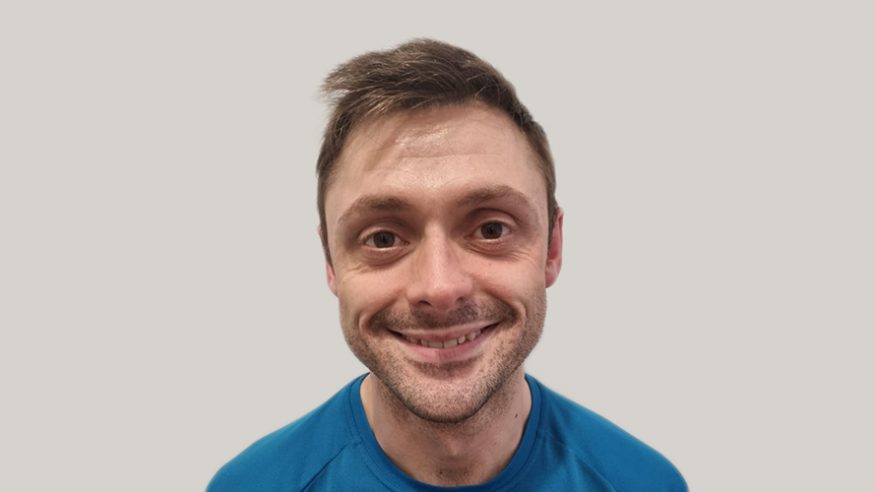Meet the Researcher – Dr Huw Morgan
14 March 2023
Skin cancer is one of the most common cancers in the world with thousands of new cases diagnosed every year. Dr Huw Morgan (BSc 2012, PhD 2018) is looking at how stem cells behave around cancer cells, with the aim of developing simpler, and less invasive treatments for skin cancer.
My interest has always been in cancer biology. I completed all my studies at Cardiff, right up to my PhD at Cardiff’s European Cancer Stem Cell Research Institute, where I work now. We look at resistance to cancer treatments and how to prevent cancer from coming back.
My research focuses on basal cell carcinoma (BCC), the most common of the three major types of skin cancer. Whilst BCC metastasises far less readily than melanoma, meaning it can usually be removed by a quick surgical procedure, the incredibly high incidence means that treatment for BCC currently takes up a great deal of clinicians’ time. So there is an unmet need to develop drug-based therapy for BCC.
We are looking at stem cells: cells which don’t just split into identical copies, but into cells with different functions. In patients with BCC, stem cells give off a protein that sticks to immune cells and stops them from attacking cancer, helping a tumour to grow. So we are working to develop a treatment that targets the stem cells and this interaction.
We have seen in initial experiments that this type of treatment can show success, but we need more data, to take the drug to the next stages of research. The Future Leaders in Cancer Research funding is allowing me to carry out the experiments needed to collect this data.
With further research, our hope for the future is to one day develop a topical formula that could simply be applied to the area of skin affected by BCC. This would free up clinicians to devote more time to patients needing urgent treatment. Ultimately, this could drastically cut waiting times and, hopefully, increase survival rates for other cancers due to earlier intervention. Also, stem cells involved in some other cancers (lung, kidney, brain) produce the protein we’re looking at, meaning that our research may be helpful in treating these types of cancer too.
To donors and fundraisers I’d like to say a massive thank you. You have helped me to drive my own experiments and take the next steps towards independent research.
Find out more about cancer research at Cardiff University.
- January 2026
- November 2025
- September 2025
- July 2025
- June 2025
- May 2025
- April 2025
- March 2025
- February 2025
- January 2025
- October 2024
- September 2024
- August 2024
- July 2024
- June 2024
- May 2024
- April 2024
- March 2024
- February 2024
- January 2024
- December 2023
- November 2023
- October 2023
- September 2023
- August 2023
- July 2023
- June 2023
- May 2023
- April 2023
- March 2023
- February 2023
- January 2023
- November 2022
- October 2022
- September 2022
- August 2022
- July 2022
- June 2022
- May 2022
- April 2022
- March 2022
- February 2022
- January 2022
- December 2021
- November 2021
- October 2021
- September 2021
- August 2021
- July 2021
- June 2021
- May 2021
- April 2021
- March 2021
- February 2021
- January 2021
- December 2020
- November 2020
- October 2020
- September 2020
- August 2020
- July 2020
- June 2020
- May 2020
- April 2020
- March 2020
- January 2020
- December 2019
- November 2019
- October 2019
- September 2019
- August 2019
- July 2019
- May 2019
- April 2019
- March 2019
- February 2019
- January 2019
- December 2018
- November 2018
- October 2018
- September 2018
- August 2018
- July 2018
- June 2018
- May 2018
- April 2018
- March 2018
- February 2018
- December 2017
- November 2017
- October 2017
- September 2017
- August 2017
- July 2017
- June 2017
- May 2017
- April 2017
- March 2017
- February 2017
- January 2017
- November 2016
- October 2016
- September 2016
- July 2016
- June 2016
- May 2016
- April 2016
- March 2016
- February 2016
- January 2016
- December 2015
- November 2015
- October 2015
- September 2015
- August 2015
- January 2015
- December 2014
- November 2014
- September 2014
- August 2014
- May 2014